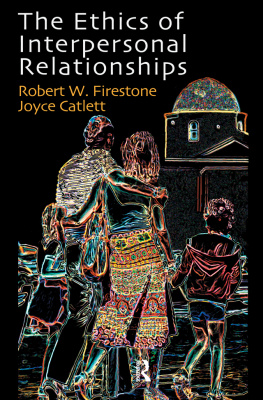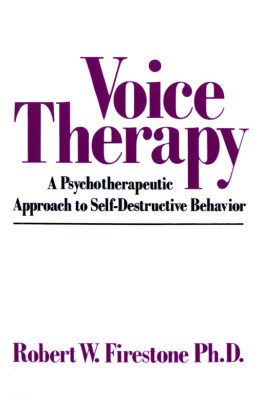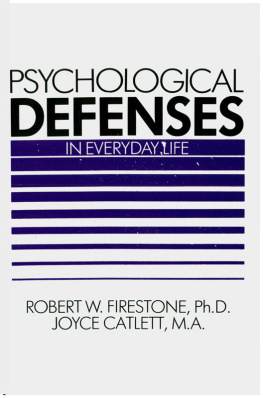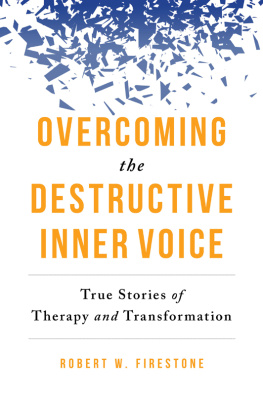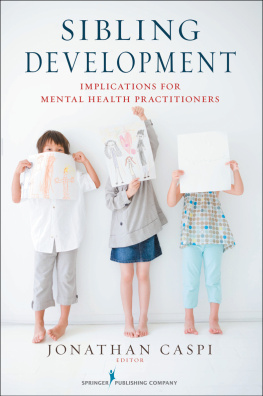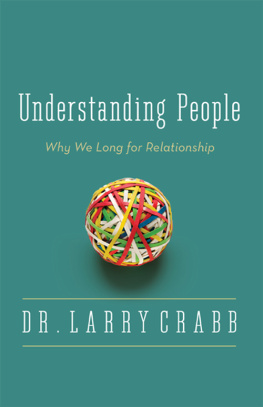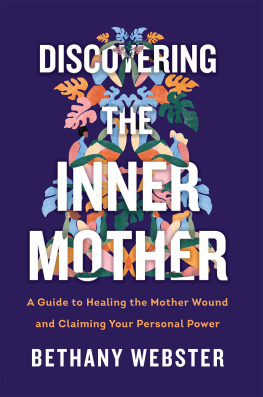THE ETHICS OF INTERPERSONAL RELATIONSHIPS
Lyric excerpts from Youve Got to Be Carefully Taught by Richard Rodgers and Oscar Hammerstein II. Copyright 1949 by Richard Rodgers and Oscar Hammerstein II. Copyright renewed. WILLIAMSON MUSIC owner of publication and allied rights throughout the world. International copyright secured. All rights reserved. Used with permission.
The Ethics of Interpersonal Relationships
Robert W. Firestone
and
Joyce Catlett
First published 2009 by Karnac Books Ltd.
Published 2018 by Routledge
2 Park Square, Milton Park, Abingdon, Oxon OX14 4RN
711 Third Avenue, New York, NY 10017, USA
Routledge is an imprint of the Taylor & Francis Group, an informa business
Copyright 2009 by Robert W. Firestone and Joyce Catlett
The right of Robert W. Firestone and Joyce Catlett to be identified as the author of this work has been asserted in accordance with 77 and 78 of the Copyright Design and Patents Act 1988.
All rights reserved. No part of this book may be reprinted or reproduced or utilised in any form or by any electronic, mechanical, or other means, now known or hereafter invented, including photocopying and recording, or in any information storage or retrieval system, without permission in writing from the publishers.
Notice:
Product or corporate names may be trademarks or registered trademarks, and are used only for identification and explanation without intent to infringe.
British Library Cataloguing in Publication Data
A C.I.P. for this book is available from the British Library
ISBN 9781855756052 (pbk)
Typeset by Vikatan Publishing Solutions (p) Ltd., Chennai, India
To Stuart Boyd, teacher and life-long friend, in appreciation for his brilliance, his humor and overall effect on my life. Most importantly, he not only taught me well but allowed me to forge ahead and develop my own theoretical ideas.
For this, Im deeply grateful.
Robert W. Firestone
Contents
Guide
We wish to express our appreciation to Tamsen Firestone for her major contribution to this work, which included re-writing and editing as well as her advice and guidance in developing the final manuscript. We are grateful to Jo Barrington, Susan Short, and Sara Bartlett for their outstanding editing skills. We also wish to thank Anne Baker, who helped us research and reference the literature on psychological issues related to moral reasoning and conduct and recent developments in the neurosciences and psychoanalytic theory. We extend thanks to Jina Carvalho, who is responsible for disseminating an expanding number of written and filmed works through the Glendon Association.
We express our gratitude to the men and women whose stories illustrate the challenges involved in moving toward more humane and ethical ways of being and living. We acknowledge their honesty and courage in revealing their personal struggles and appreciate their ongoing participation in our common endeavor. They have been strongly motivated to make the insight and understanding that they have gained over the past three decades available so that others might benefit from their experiences. Finally, we thank Oliver Rathbone, Managing Director of Karnac Books, for recognizing the importance and timeliness of this work and Christelle Yeyet-Jacquot for her interest and help in completing this project.
The names, places, and other identifying facts contained herein have been fictionalized and no similarity to any people, living or dead, is intended.
Foreword
The ethics of interpersonal relationships
He who is too busy doing good finds no time to be good.
Rabindranath Tagore
Why is it so difficult to do what we think is right? Living ethically should be a common occurrence in all households. I dont know about you, but I feel I should be closer to friends and families, donate more money to the needy, take better care of my body with only good foods and regular exercise, volunteer at the nursing home, and the list goes on. I guess I lack courage?
In graduate school I was fascinated by the work of Lawrence Kohlberg and his theory of moral development. I even attended a training seminar with him at Harvard University in the interest of learning to live by what I consider higher values. When I finished the program I was even more challenged to navigate lifes different stages of development and to live a life based on principles.
In The Ethics of Interpersonal Relationships, Robert Firestone and Joyce Catlett identify the source of the ethical dilemmas that occur when trying to live a principled life. I am impressed with their candor in describing how we hurt those we love most and keep ourselves from the happiness we seek. This book provides a major shift in understanding why people are mean, unethical and not compassionate. As the authors state, this work is an attempt to explain the source of human destructive behavior, how it manifests itself in personal relationships and suggests a treatment modality for coping with negative, acting-out behavior.
Defenses are ways of thinking and acting which we believe will protect us from being hurt. However, they ultimately bring what they were meant to guard against. We can see this in the person who wants love but does not believe people can be trusted. Or the person who wants to get close but is afraid of being taken advantage of. Or even the person who grows up in the alcoholic family, vowing they will never do the same, only to marry an alcoholic or to become an alcohol dependent person.
The basic premise of this book is the theory that is outlined in two of Dr. Firestones earlier works, The Fantasy Bond and Voice Therapy . The Fantasy Bond and Voice Process are the primary defense mechanisms that interfere with our ability to live by ethical principles, values, and ideals. Because the problem is psychological, this book approaches the subject of ethics from a point of view that is compassionate and understanding rather than one that is judgmental.
Robert Firestone and Joyce Catlett live by the ideals and principles that they put forth. A few years ago I was invited to Bobs home for dinner and I found myself in the midst of a circle of family and friends. Everyone present (men, women and children) actively participated in the evening: hosting, cooking, setting up and serving, and then cleaning up. After dinner, most of them gathered in the living room for an evening discussion, and I was invited to join them. Apparently, they meet often to talk about anything they want--from issues that they are personally struggling with to problems they are having with each other to just reporting how their day was. Participants were urged to speak openly and, when feelings arose, they were encouraged to feel them. As I sat observing, many issues were addressed and resolved in a short period of time. I left the evening I spent amongst Bob and his family and friends with feelings of admiration and respect for these courageous people. I had witnessed them actively involved in the process of living by the ethical principles that they aspired to.
It is my hope that this book receives a wide readership as it offers a major breakthrough as to how to make our lives principled through understanding psychological (not moral) processes. Thank you, Bob and Joyce, for your contribution to humanity.
In closing, remember the wise words of Mark Twain, Always do rightthis will gratify some and astonish the rest.

